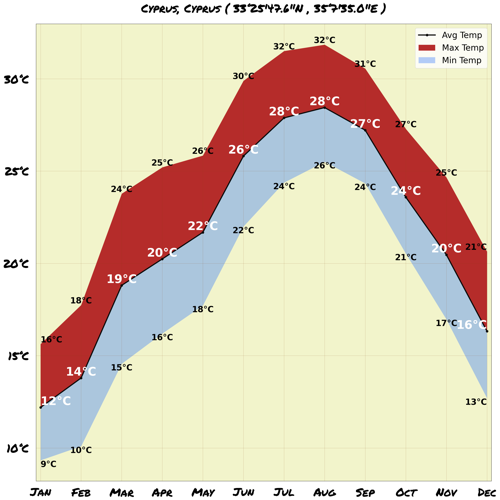Understand
Cyprus, a Greek island with a fascinating historical and cultural background, has witnessed the footsteps of ancient civilizations. It was initially inhabited by the Mycenaean Greeks in 1400 B.C. Throughout its existence, the island experienced the influence of Alexander the Great, the Ottomans, and ultimately gained independence from the United Kingdom in 1960. Despite its constitution's intent to encourage power-sharing between the Greek Cypriot majority and the Turkish Cypriot minority, tensions arose. With the backing of Greece and Turkey, the two populations clashed in the past, leading to the division of the island. Turkey now controls the northern and eastern 37% of Cyprus, which in 1983 declared independence as the Turkish Republic of Northern Cyprus, recognized by Turkey alone. A narrow buffer zone, overseen by the United Nations, acts as a peaceful barrier between the Greek and Turkish Cypriot populations. Although efforts are being made towards reunification, the government of the Republic of Cyprus is the only universally recognized authority on the island. As the involvement of the European Union grows, hope for a resolution and reunification continues to flourish, ensuring a brighter future for Cyprus.
Get in
Cyprus is a member of the Schengen Agreement, but has not yet fully implemented it. For EU and EFTA citizens, together with those from Switzerland, an officially approved ID card or passport is sufficient for entry to Cyprus. No visa is required for any length of stay. However, if Cyprus requires a visa for your nationality, having a valid Schengen visa may waive this requirement. For more information, inquire with your travel agent or contact the local consulate or embassy of Cyprus. Please note that nationals of certain non-EEA countries do not need a visa for entry into the Schengen Area. These countries include Albania, Andorra, Antigua and Barbuda, Argentina, Australia, Bahamas, Barbados, Bosnia and Herzegovina, Brazil, Brunei, Canada, Chile, Colombia, Costa Rica, Dominica, El Salvador, Georgia, Grenada, Guatemala, Honduras, Israel, Japan, Kiribati, Macedonia, Malaysia, Marshall Islands, Mauritius, Mexico, Micronesia, Monaco, Montenegro, Nauru, New Zealand, Nicaragua, Palau, Panama, Paraguay, Peru, Saint Kitts and Nevis, Saint Lucia, Saint Vincent and the Grenadines, Samoa, San Marino, Serbia, Seychelles, Singapore, South Korea, Switzerland, Taiwan, Timor-Leste, Tonga, Trinidad and Tobago, Tuvalu, Ukraine, United Arab Emirates, United States, Uruguay, Vatican City, Vanuatu, Venezuela, and certain British passport holders. Please remember that for these non-EU/EFTA visa-free visitors, the maximum stay in the Schengen Area is 90 days within a 180-day period. Working during the stay is generally not allowed. The counter for the stay duration begins upon entering any country in the Schengen Area and is not reset by moving between Schengen countries. Exceptions to the 90-day limit may apply for Australian and New Zealand citizens who only visit specific Schengen countries. British Overseas Territories citizens connected to Gibraltar have unlimited access to the Schengen Area, while other British nationals may require visas. For nationals of Albania, Bosnia and Herzegovina, Macedonia, Montenegro, Serbia, Serbia residents of Kosovo with Serbian passports, and Taiwan, additional passport or biometric passport requirements may apply. For more detailed information, including specific visa requirements, please visit the New Zealand Government's explanation page.
Map & Climate
Popular Foods
 Souvlaki is one of the most popular dishes in Cyprus. It consists of seasoned, skewered, and grilled meat, typically pork or chicken, accompanied by pita bread and sides like potatoes, salad, and tzatziki (a yogurt-based sauce). The meat is marinated in herbs, olive oil, and lemon juice, imparting a rich flavor to the dish.
Souvlaki is one of the most popular dishes in Cyprus. It consists of seasoned, skewered, and grilled meat, typically pork or chicken, accompanied by pita bread and sides like potatoes, salad, and tzatziki (a yogurt-based sauce). The meat is marinated in herbs, olive oil, and lemon juice, imparting a rich flavor to the dish. Koupepia is another popular Cypriot dish, featuring vine leaves wrapped around a mixture of minced meat (often beef or lamb), rice, onions, and various herbs and spices. They're then slow-cooked in a tomato and wine sauce, resulting in a delicious fusion of flavors and textures. Some versions may also include pine nuts or raisins for added depth.
Koupepia is another popular Cypriot dish, featuring vine leaves wrapped around a mixture of minced meat (often beef or lamb), rice, onions, and various herbs and spices. They're then slow-cooked in a tomato and wine sauce, resulting in a delicious fusion of flavors and textures. Some versions may also include pine nuts or raisins for added depth. Halloumi is a semi-hard, unripened cheese made primarily from a mixture of goat's and sheep's milk. Its high copper content gives halloumi its distinctive firm texture and rich, salty taste. Halloumi can be either smoked or unsalted, and is traditionally paired with watermelon or figs for a contrast of sweet and savory flavors.
Halloumi is a semi-hard, unripened cheese made primarily from a mixture of goat's and sheep's milk. Its high copper content gives halloumi its distinctive firm texture and rich, salty taste. Halloumi can be either smoked or unsalted, and is traditionally paired with watermelon or figs for a contrast of sweet and savory flavors.




Comments
NO COMMENTS